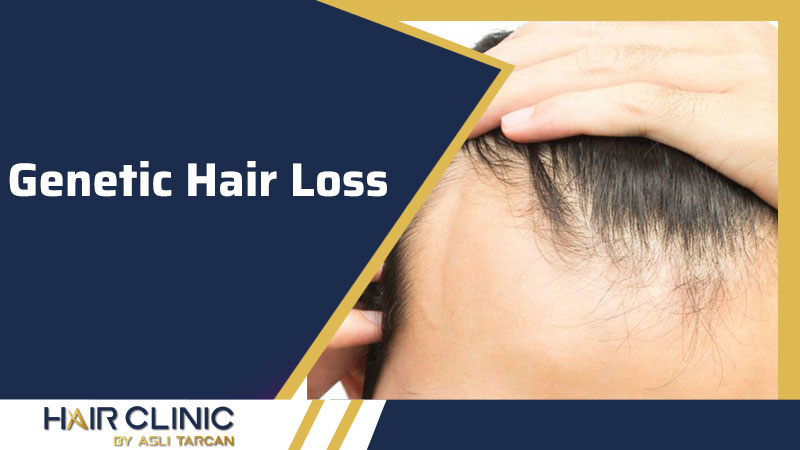Genetic hair loss is a natural and common occurrence that affects millions of people at some point in their lives. According to the American Hair Loss Association, those who struggle with the effects of this condition are affected professionally, socially, and emotionally. In fact, it is not uncommon for men with hair loss to change careers.
Thinning hair and possible hair loss can affect both men and women and can be caused by any combination of hormones, genes, and/or the aging process. Genetics, however, have been shown to have about an 80% influence on whether or not a person will have hair loss, leading to male pattern baldness, according to a study by the National Center for Biotechnology Information. This article will look at the causes and symptoms of genetic hair loss and look at the available prevention methods and treatments for this condition.
Your genetic makeup plays an important role in hair loss and the thickness of your hair. Let’s explore this issue in a little more detail now.
Male pattern baldness and genetic hair loss
Male pattern baldness is the type of hair loss that many men will experience at some point in their lives. This hair loss usually starts at the top/crown of the head, with hair loss also appearing on the front of the hairline.
Male pattern baldness tends to start in thirty-one men, although it can occur earlier than that time. By the time a man reaches middle age, he will usually have some degree of male pattern baldness depending on his genes.
The causes of hereditary baldness
Non-genetic hair loss can be caused by excessive hair coloring, bleaching, the use of heat tools, tight ponytails, and/or hair pulling, but this does not apply to genetic hair loss. If you are prone to hereditary baldness, you can do everything right for your scalp and even lose your hair.
You have probably heard before if your mother’s father was bald, you also have a good chance of inheriting the trait. This is because the bald gene – the androgen receptor – is located on the X chromosome, which is inherited from the mother. However, studies have shown that men whose fathers are bald are at greater risk of having male pattern baldness than those whose fathers did not have hair loss.
In addition to baldness, children can also inherit dihydrotestosterone (DHT) sensitivity from their parents. DHT is a sex hormone in men that causes their hair follicles to shrink over time and this eventually causes baldness in men.
Symptoms of hereditary baldness
You know that hair loss is the main symptom of hereditary baldness, but make sure you know how natural hair loss is before you start panicking. Hair loss is defined as the thinning of the hair that proceeds to complete the hair loss in any area of the scalp. People usually lose about 100 strands of hair a day (except for those who were just born or had a serious illness so they can lose more).
Therefore, if you notice that hair falls out in large masses in your shower, comb, or pillow, be sure to visit your doctor – especially if your scalp is red, broken, itchy, or irregular in the areas of hair loss. This may indicate the presence of a secondary condition or a more serious condition, such as a fungal infection, alopecia, or other skin problem.
Men will be able to make a difference when their hair starts to fall out due to the change in the shape of their hairline. In males, genetic hair loss begins at the temples and crown and recedes along the M-shaped forehead. In the advanced stages of baldness, the only end of the hair along the back of the head is the only one on the left.
Hair loss in women is a little less noticeable, as they lose hair all over the head, making the loss more widespread but better hidden. For women, the forehead and temples are usually unaffected. rather, the thinning of the hair at the top of the head becomes noticeably thinner over time.
Balding and Your Mother: Dissolving a common myth
A common myth is that male pattern baldness is transmitted from mother to family. A related myth is that if your grandfather was bald, it is possible that you are also bald and that baldness will go away for a generation.
But this is not necessarily the case.
The fact is that her genetic baldness is much more complicated. In some cases, a man with a bald grandfather will have full hair and vice versa. Your father’s genes will also affect the chance of future hair loss. As a general rule, if baldness runs in your family, you are more likely to suffer from male pattern baldness.
Female hair thinning and genetics
While most people think of genetics in relation to male pattern baldness, genes will also have an effect on the nature of thinning hair.
Women’s genetic hair loss is very different from men’s genetic hair loss. While men will lose their hair in condensed parts of their scalp, women may notice that their hair becomes thinner over time, sometimes leaving parts of the scalp more exposed. This is part of the aging process and a variety of genetic and environmental factors can lead to more intense hair thinning.
Treatments for hereditary baldness
You will be relieved to know that hereditary baldness does not mean that you have no choice but to be bald. Wigs, bangs, braids, and other variations of fake hair are always available to those who want to make hair loss more discreet. However, some people may find that a shaved head is appropriate for their facial features or bone structure and choose to embrace the look.
If you want to grow your hair naturally, minoxidil or finasteride has been widely used. These drugs can be used to promote new hair growth, but be aware that each person reacts differently to them – and they have a fair share of their side effects.
How to prevent hair loss as you grow older
If you already know that you have a family history of hair loss, now is the time to be proactive in preventing hereditary baldness if this is something you are trying to avoid. As mentioned above, minoxidil (otherwise known as Rogaine) will slow down hair loss in both men and women. This product can be applied topically to the scalp twice a day and is available on the counter. People usually see small regenerative effects in just four months with consistent use. However, if you stop using the drug, you run the risk of growing hair that has grown back.
For men, finasteride (known as Propecia or Proscar in stores) can also be used to slow down hair loss. This is an oral pill that controls hair loss hormones. According to Harvard Health, about 99% of men are able to prevent baldness using finasteride, and about two-thirds of men who use it experience some hair regeneration.
Women should not use Propecia, especially if they are pregnant or may become pregnant soon, as it may cause genetic abnormalities. If you are a woman with elevated male hormones, you prefer to seek hormone therapy through birth control pills. Ask your doctor about the best solution for you about genetic hair loss.



